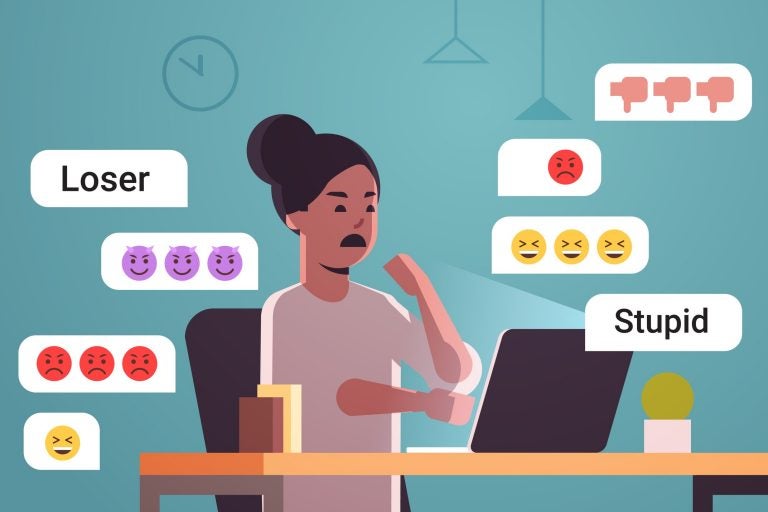How psychology is just catching up with the effects of online hate
When online creators get hateful comments — who can help?
Listen 8:06
(mast3r/Big Stock Photo)
Lindsay Ellis is a video essayist. She makes videos commenting on films, TV shows, and other media. These videos go over topics such as the death of the Hollywood movie musical, product placement, and a nine-part series on the basics of film studies and film theory using only Michael Bay’s “Transformers”movies.
More than 860,000 people subscribe to her YouTube channel, and more than 7,000 people pledge to fund her work every month.

But there is also this difficult aspect to what Ellis does: online hate.
It started from day one, with comments on her appearance or people saying that a man must be writing her lines.
At first, she would collect the comments she thought were funny. But she stopped doing that pretty quickly.
“Anyone, but women especially, … that has any kind of online presence — they all have a stalker story,” Ellis said.
In 2013, a stalker targeted Ellis and other female content creators..
“He was a burp fetishist. He would just flood everyone’s mentions with requests for, ‘Burp for me.’”
She knows it sounds ridiculous and kind of funny. Most of the people she told were bemused to hear someone wanted to hear her burp. But it went on for months.
“Whenever everyone started blocking him, that’s when he kinda started to turn violent or at least his rhetoric started to turn violent: ‘I’m going to rape you.’ … My friend had just had a baby at the time, like, ‘I’m going to kill your baby.’”
At the time, Ellis and the other women were all in New York. They printed out as much evidence as they could and went to the police.
“Effectively, they said … ‘Yes, this is an arrestable offense, but it’s a misdemeanor, so we can’t break into his house even though we know where he lives and he has a record.’ Which was very illustrative in just learning how not just impotent law enforcement is, but how much … it’s not really a priority for them.”
“My harassment journey … only got worse from there,” Ellis said.
In 2017, Ellis tweeted a joke about the conspiracy theory of white genocide, an idea coined by white supremacists that somehow white people are being threatened. That made her a target for far-right activists, who flooded her with comments.
“The knowledge that there are so many white supremacists out there that know who you are and wish you ill and … the fact that you are being made to think about this … it affects your brain,” she said. “Fear messes with your brain, especially when it’s sustained over a period of weeks and months. Like this was.”
She tried to find help from therapists, but generally they did not know what to do.
“They just kind of tend to ignore it in favor of discussing other things,” she said. “And it’s not like the other things are not relevant whenever you’re going through therapy, but every therapist I’ve ever been to, this particular issue that occupies so much of my daily existence is a really big blind spot for them.”
Some therapists have even asked Ellis why she doesn’t just log off and stop being online.
“It’s not only saying, ‘Why don’t you cut off like half of your social contacts?’ It’s basically saying, ‘Why don’t you quit and do something else?’ And that doesn’t read like a solution to me.”
This is her livelihood. The internet makes it possible for individual people to become online brands. But there’s a downside to being a one-woman brand.
“Where a corporation will have social media managers and HR and PR teams and marketing, we only have ourselves, and in my case, one lonely assistant that has to moderate,” she said. “I think that people are so used to dealing with corporations and brands, they don’t understand that they are not dealing with a corporation. They’re dealing with a person.”
Four in 10 Americans have been harassed online, which could mean being called names, or someone posting something embarrassing, or physical threats and stalking. Therapists and psychologists have studied cyberbullying for years, but there isn’t much research on how to help the victims of it.
“That’s a huge deficit that needs to be filled,” said Robin Kowalski, a psychologist at Clemson University who studies bullying and cyberbullying.
She said most of the cyberbullying research has been on kids and only recently moved to look at online harassment among adults. Which means that if a therapist or mental health professional has a client who is being harassed online and wants to know how to help, the research doesn’t really exist. So mental health professionals can only deal with the outcomes, like anxiety, depression, and thoughts of suicide.
Educational psychologist Kathryn Stamoulis has helped clients such as teenage girls who are harassed online by their peers or ex-boyfriends. And she knows it’s a problem beyond the teen years and for people who make their living online. Though there might not be specific treatment guidelines about online harassment, she helps her clients by drawing on techniques for dealing with similar issues, like sexual harassment and bullying.
“The field knows that this is a problem, research is coming out, but as of yet we don’t have anything saying, ‘This is the best therapeutic strategy to deal with it.’”
This year, Stamoulis is leading the American Psychological Association’s Society for Media Psychology and Technology, a subgroup of the organization that is writing guidelines to help therapists treat victims of online abuse.
For now, Lindsay Ellis still sees her therapist. But she also gets support from her close friends, and from peers who make a living online and face the same problem.
“We just talk about how afraid we are and how we have to meter everything we say. And how everything is optics, and your lived experience does not matter. The only thing that matters is trying to cultivate an online brand that will mitigate the harassment,” she said.
“The only thing we can really do is just sort of vent because we don’t really have any solutions and it’s incredibly, incredibly isolating.”
WHYY is your source for fact-based, in-depth journalism and information. As a nonprofit organization, we rely on financial support from readers like you. Please give today.







